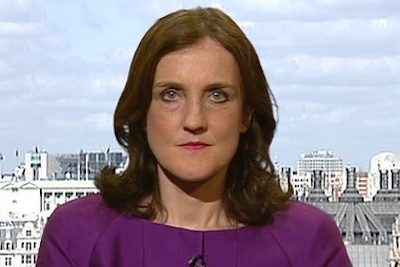
A fresh round of talks aimed at reviving the Stormont Assembly and the other political institutions of the peace process are expected to begin next month.
However, unionists have said will wait for a decision on demands for a north Belfast parade inquiry before committing itself to the negotiations.
British Direct Ruler Theresa Villiers announced last weekend that she would convene a new round of all-party talks aimed at breaking the ongoing deadlock in the North’s power-sharing coalition of unionists and nationslists.
Villiers (pictured) has yet to indicate what the London government plans to do regarding the parades inquiry, although a document leaked last week suggested it was being given serious consideration.
Both unionist parties walked away from the last round of talks in July after a Parades Commission ruling restricting the Orange Order’s July 12 march past Ardoyne in north Belfast.
For the first time in recent years, the Dublin government is also expected to play a role in elements of the negotiations, which in addition to flags, parades and the past, may also encompass spending within the Six Counties and Stormont’s structures.
Also colouring the discussions may be an opinion poll this week which showed that over 40% of the population in the North are in favour of Irish reunification within twenty years. In the past, such polls have tended to dramatically undercount nationalist opinion.
Sinn Fein leader Gerry Adams welcomed the fresh round of talks but said there could be no preconditions.
“There must be an open agenda and the political will to reach agreement,” he said.
“Sinn Fein is up for these talks -- we are seeking to resolve the outstanding issues of previous agreements, the issues of additional powers and protecting frontline services, and the working of the institutions north and south.”
He said a timeframe for the negotiations was required and the British government needed to suspend #87m in ‘fines’ which it has threatened to apply to the annual subvention for the Six Counties over the failure to implement welfare cuts.
It was a year ago that the process chaired by Richard Haass got under way but after three months of negotiations which intensified over the Christmas period the proposals tabled by the US diplomat were rejected by both unionist parties.
The process was reconvened in July, but it faltered almost immediately as unionists walked out almost immediately in protest at the Parades Commission’s decision on the Twelfth parade past Ardoyne.
Both Peter Robinson and Martin McGuinness played down reported grumblings in some unionist quarters about Dublin’s part in the upcoming process, particularly by Robinson’s colleague, DUP MP Jeffrey Donaldson.
“I can’t force Martin (McGuinness) to talk or not talk to someone and he can’t do that to me either,” Mr Robinson said.
The DUP leader and First Minister said it was important to get down to the talks as there was “a very real danger” for the Stormont institutions unless agreement is reached. Earlier this month, he said the Six-County administration was “no longer fit for purpose”.
But Martin McGuiness earlier played down the possibility of a return to Direct Rule from Westminister, which might allow the London government to bypass Sinn Fein opposition to budget cuts.
“I don’t accept that there’s any inevitability about the power-sharing Executive collapsing,” he told RTE radio.
“There is no alternative to power-sharing and the all-Ireland institutions. There is absolutely no alternative to the Good Friday Agreement.
“What we need to see is the Good Friday Agreement implemented, and of course the British government have a major responsibility to deliver on things like the human rights bill, to deliver on things like the Pat Finucane inquiry.”
Mr McGuinness said the parties in the North were in broad agreement on a range of issues but that matters relating to the past “need to be dealt with”.
“I think the challenge we face is finding solutions to those problems, and we in Sinn Fein are very determined to play our part in these upcoming talks, and be as positive and constructive as we have been over the course of the past 20 years,” he said.
“Of course we have an added difficulty, and the added difficulty is the British government’s approach to all of this is a major part of the problem. The British government didn’t sign up for the Haass proposals and of course the British government welfare cuts and austerity measures are creating huge difficulty for our administration.”
Dublin’s Minister for Foreign Affairs Charlie Flanagan said that he was in no doubt the US administration would play a “constructive” part in the talks. He was speaking after meeting US vice president Joe Biden and Secretary of State John Kerry in Washington DC.
Ex-US senator Gary Hart visited Ireland in August on a fact-finding trip during which he met the north’s main parties.
![[Irish Republican News]](https://republican-news.org/graphics/title_gifs/rn.gif)
![[Irish Republican News]](https://republican-news.org/graphics/title_gifs/harp.gif)

